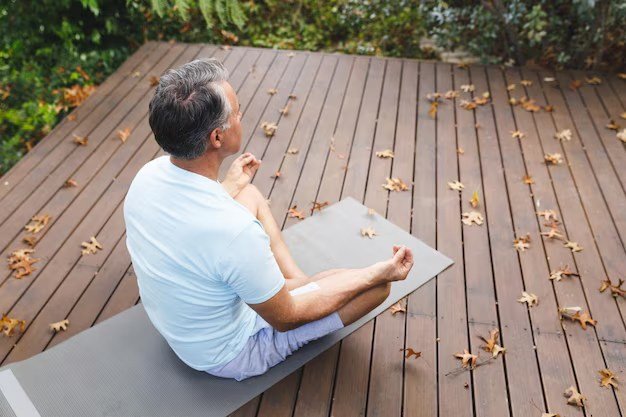Wellness Beyond the Mat: Simple Habits for Finding Inner Peace

Yoga is excellent, but true wellness isn’t just about what you do on the mat. It’s about what you do when you’re off, too. Yoga is a lifestyle—one that promotes balance, calm, and peace. And while the asanas (poses) Help build strength and flexibility, it’s the habits you make outside of yoga that really support long-term well-being.
Here’s the thing: it’s easy to get caught up in the fast pace of life and forget to take care of yourself in ways that go beyond a good yoga class. So, let’s dive into some simple habits that can Help you feel more peaceful and centered, no matter what’s happening around you.
1. Sleep Like It’s Your Job
Why Sleep is a Game-Changer
It’s no secret—good sleep is crucial. Without it, we’re cranky, stressed, and can’t think straight. Yoga helps us relax, but if you’re not getting enough sleep, you’re missing out on a significant part of your overall wellness. A good night’s sleep resets everything—your mind, your body, your emotions.
How to Improve Your Sleep
- Maintain a Regular Bedtime: Go to bed and wake up at around the same time every day, including weekends. Your body loves routine.
- Create a Calming Routine Before Bed: Whether it’s reading, stretching, or just breathing deeply, find something that helps you wind down.
- No Screens Before Bed: Give Your Eyes a Break. Avoid using phones, computers, and TV for at least an hour before bed, allowing your body to fall asleep naturally.
2. Eat Mindfully, Not Just for Fuel
Why Mindful Eating Is Important
We all know that food fuels our bodies, but mindful eating goes beyond just filling our stomachs. It’s about truly appreciating your food and being cognizant of how it affects your body and mind. Yoga teaches us to be in the moment, and conscious eating is a great way to bring that same awareness to your meals.
Easy Tips for Mindful Eating
- Eat With Full Attention: Switch off the TV, set aside your phone, and concentrate on your meal. You may find it far more enjoyable.
- Take It Slow and Chew Properly: Enjoy every bite at a steady pace. This supports better digestion and can also reduce the chances of overeating.
- Eat Whole Foods: Whenever possible, opt for foods that nourish your body, such as fruits, vegetables, and whole grains. It’ll make a big difference in how you feel.
3. Move Your Body (Even If It’s Just a Little)
Why Moving Matters
Yoga isn’t just about stretching—it’s about moving with intention. But we don’t always have time for a whole class every day. That’s okay! Even small movements throughout your day can have a significant impact. Moving your body helps release tension, boosts energy, and improves mood. It’s also a great way to clear your mind.
How to Move More Every Day
- Take Movement Breaks: If you sit for long periods, get up every hour and stretch or walk around. It doesn’t have to be a workout—get your body moving.
- Do Simple Stretches: Try some light stretching throughout the day, especially after sitting for a while.
- Find Ways to Enjoy Movement: Whether it’s dancing, walking, or some gentle yoga, find something you love so it doesn’t feel like a chore.
4. Breathe Deeply and Often
Why Deep Breathing Is So Powerful
It sounds simple, but breathing deeply is one of the most effective ways to reduce stress and achieve clarity. The simple act of slowing down your breath can calm your nervous system and Help you feel more present in the moment. This is a tool yoga teaches us, and it’s something you can practice anytime, anywhere.
Easy Breathing Techniques to Try
- Try 4-7-8 Breathing: Inhale for 4 seconds, hold for 7 seconds, then exhale for 8 seconds. Repeat a few times whenever you feel stressed.
- Take Breaks for Deep Breaths: Set a reminder to pause during the day and take a few slow, deep breaths to reset and refresh.
- Practice Breathwork in the Morning: Starting your day with deep breathing can set a peaceful tone for the rest of it.
5. Practice Gratitude: It Shifts Your Focus
Why Gratitude Makes a Difference
Gratitude is a powerful practice that shifts your focus from what’s missing in your life to what’s already abundant. When we focus on the positives, we naturally feel calmer and happier. It’s one of the simplest ways to bring more peace into your day.
1. Start a Gratitude Journal
- Every day, write down three things you’re grateful for.
- Keep it simple: it could be enjoying a warm cup of coffee, a nice walk outside, or a moment of laughter.
- Over time, this habit trains your mind to notice the small joys that often go unnoticed.
Tip: Keep a notebook by your bed and write before sleeping—it helps you end the day on a positive note.
2. Share Your Gratitude
- Tell someone you appreciate them or give a kind compliment.
- Gratitude doesn’t just stay within you—it spreads positivity to others.
- Small gestures can strengthen your connections and make both you and the other person feel good.
Example: Thank your yoga teacher for guiding you, or text a friend to let them know you value their presence in your life.
6. Take Tech Breaks: Give Your Mind a Rest
Why We Need to Unplug
We’re all guilty of being glued to our screens. Social media, work emails, and constant notifications can leave us feeling drained and stressed. Taking a break from technology gives your mind a chance to reset and reduces stress. It’s one of the easiest ways to bring more peace into your life.
Simple Ways to Disconnect
- Create Screen-Free Time: Set aside times during the day when you’re not on your phone or computer, especially in the morning or before bed.
- Take a Digital Detox: Set aside a few hours or a whole day each week to disconnect from screens. Use that time to do something you enjoy offline.
- Be Mindful of Your Time Online: Be intentional about how and when you engage with technology. Avoid scrolling mindlessly.
7. Spend Time in Nature: Feel the Ground Beneath You
Why Nature Is So Restorative
Something is healing about being outside. Nature has a way of slowing us down and putting everything into perspective. Whether you’re in a park or on a hike, spending time outside helps clear your mind, reduces stress, and boosts your mood.
How to Connect with Nature
- Take Daily Walks: Try to get outside for at least 20 minutes every day. Walking in nature, even just around the block, can Help reset your mind.
- Do Activities Outdoors: Whether it’s gardening, hiking, or just sitting outside with a cup of tea, make an effort to spend time outside.
- Try Grounding (Earthing): Walk barefoot on grass or sand—it’s believed to Help you feel more connected to the earth and reduce stress.
8. Build Supportive Relationships: Surround Yourself with Positivity
Why Healthy Relationships Matter
The people you spend time with can have a significant impact on your mental and emotional health. Healthy, supportive relationships bring joy, reduce stress, and Help you feel connected to something greater than yourself. Negative relationships, on the other hand, can drain your energy.
How to Foster Healthy Relationships
- Prioritize Time with Loved Ones: Spend quality time with the people who lift you and make you feel good about yourself.
- Set Boundaries: Protect your peace by establishing clear boundaries with individuals who drain your energy or introduce negativity into your life.
- Practice Active Listening: Take the time to listen to others without judgment, allowing them to express themselves fully. It helps create stronger, more meaningful connections.
9. Simplify Your Life: Less Is More
Why Simplicity Brings Peace
We all know how overwhelming life can get, especially when we have too much going on. Simplifying your life—whether it’s decluttering your home or reducing your commitments—creates space for peace and clarity. Less clutter, less stress.
How to Simplify Your Life
- Declutter Your Space: Start small—clear out your closet or tidy your desk.
- Simplify Your Schedule: Turn down commitments that don’t match your values or goals. Put your time and energy into what really matters most to you.
- Practice Minimalism: Consider letting go of things you don’t need—both physical possessions and mental clutter.
10. Reflect Regularly: Check In with Yourself
Why Self-Reflection Is Important
Taking time to check in with yourself is key to personal growth and peace of mind. Self-reflection helps you evaluate how you’re feeling, what’s working in your life, and where you might need to make changes. It’s a way to stay aligned with your values and intentions.
How to Reflect on Your Life
- Set Aside Time for Reflection: Whether it’s once a week or once a month, take time to journal or meditate on where you’re at in life.
- Ask Yourself Key Questions: What am I grateful for? What’s stressing me out? What do I need to let go of?
- Use Reflection to Adjust: If something isn’t working for you, use your reflections to make small changes that support your peace.
Conclusion
Living with inner peace isn’t about being perfect or having it all together. It’s about making small, consistent choices that prioritize your well-being. By forming habits such as good sleep, mindful eating, and regular physical activity, you can cultivate a lifestyle that supports your body, mind, and soul. Start with one or two habits that resonate most with you, and take it one day at a time.
